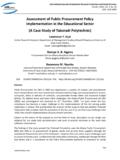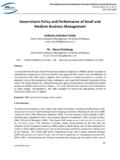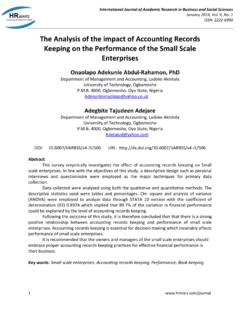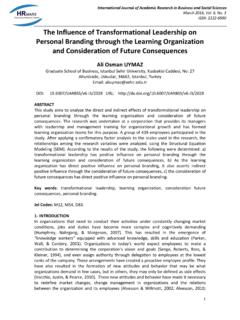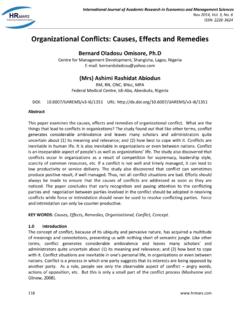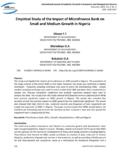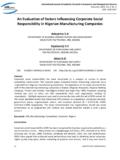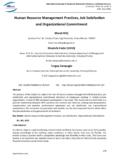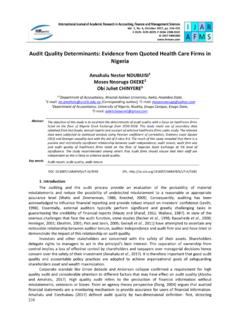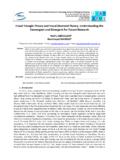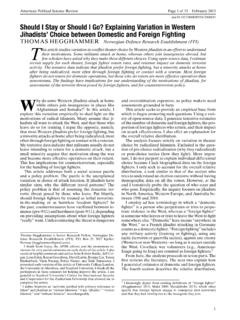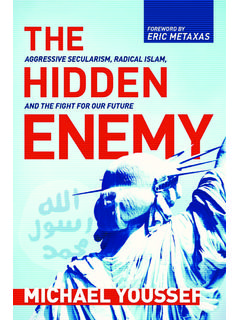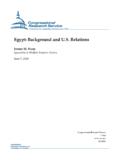Transcription of Political Islam in Islamism and Post Islamism: A …
1 Full Terms & Conditions of access and use can be found at Political Islam in Islamism and Post Islamism : A Study on Islamic Renaissance Front (IRF) Muhammad Atiullah Ohtman, Zuraini binti Jamil@Osman & Siti Noranizahafizah Boyman To Link this Article: DOI: Received: 20 Dec 2017, Revised: 19 Jan 2018, Accepted: 21 Jan 2018 Published Online: 04 Feb 2018 In-Text Citation: (Ohtman, Jamil@Osman, & Boyman, 2018) To Cite this Article: Ohtman, M. A., Jamil@Osman, Z. binti, & Boyman, S. N. (2018). Political Islam in Islamism and Post Islamism : A Study on Islamic Renaissance Front (IRF). International Journal of Academic Research in Business and Social Sciences, 8(1), 686 704. Copyright: 2018 The Author(s) Published by Human Resource Management Academic Research Society ( ) This article is published under the Creative Commons Attribution (CC BY ) license. Anyone may reproduce, distribute, translate and create derivative works of this article (for both commercial and non-commercial purposes), subject to full attribution to the original publication and authors.
2 The full terms of this license may be seen at: Vol. 8, , January 2018, Pg. 686 - 704 JOURNAL HOMEPAGE International Journal of Academic Research in Business and Social Sciences Vol. 8, , January 2018, E-ISSN: 2222-6990 2018 HRMARS 687 Political Islam in Islamism and Post Islamism : A Study on Islamic Renaissance Front (IRF) Muhammad Atiullah Ohtman, Zuraini binti Jamil@Osman & Siti Noranizahafizah Boyman Senior Lecturers, Department of Social Studies and Citizenship, Faculty of Human Sciences, Universiti Pendidikan Sultan Idris Abstract Asef Bayat suggests a new approach for Islamists, called Post- Islamism which is broadly welcomed researchers towards current Political Islam . Otherwise, Islamic Renaissance Front (IRF) is engaging Post- Islamism approach as a resistance to Islamism and suggested application of secularism and liberalism in Malaysian Political arena. The objectives of this paper are to analyze and address clear perceptions that had found in Islamism and post- Islamism discussion.
3 The main methodology for this paper is content analysis for interpreted IRF s printed publications and electronic articles. This study also analyzed based on latest findings on Islamic tenets. The research covers inductive method that explains IRF works. Deductive method is also used for generalization in order to observe essential content of Islamism and post- Islamism . The study also refers to experts on the field of Islamic thought. Three members of Department of Islamic Development Malaysia (JAKIM) were chosen and interviewed so as to be more accurate in Islamic affairs explanation. The results showed that secular and liberal thought is found in the post- Islamism which is the same essence in Islamism critics. Additionally, this article resolves confusion in discourse of Political Islam especially within secularism, liberalism and democracy issues. Post- Islamism also used Turkey s Political Model as a collateral argument.
4 However, researchers such as Sengupta have found that Turkey s Political Model carries secularism and liberalism as well. Therefore, Turkey s Political Model is actually secular Political concepts. Besides, there are clear IRF calls for Islamist to transform Islamism to post- Islamism approach and to be secular or liberal. Keywords: Political Islam , Islamism , Post- Islamism , Liberal, Secular. Introduction West researchers had placed Islamism connotation as an important subject to discuss about Political Islam . There are problems frequently discussed whether Islamism had actually based on religion itself or accommodate by current issues. Desai (2007) choose that Islamism is not Islam because Islam and Islamism are different. He argued that Islam is referred to religious entity. International Journal of Academic Research in Business and Social Sciences Vol. 8, , January 2018, E-ISSN: 2222-6990 2018 HRMARS 688 Otherwise, Islamism refers to Islamic Political entity which it means Islamism is brought Political agenda.
5 Generally, Islamism has two types that view Islamism approach. First type is moderate Islamism who upholds democracy and nationhood, and second type is extreme Islamism who upholds military and radical approach. Some researchers stress that neither moderate Islamism nor extreme Islamism are success in Political arena. Asef Bayat (2007), Gilles Kepel (2003) and Oliver Roy (1994) vowed that both Islamism types had failed to lead nation and bring aspirations of the people. Therefore, there are numerous criticisms and constant rejections towards Islamism approach. Kepel and Roy critics is connected to Bayat s (2007) proposal, who wrote based on progressive leadership experience against conservative Iranian cleric. In 1996, the progressive experience has been applied and was called as Post- Islamism . Later, this Post- Islamism terminology was popularized and debated in Western discourse.
6 They questioned on validity and actual content of post- Islamism . Especially, Francois Burgat (2003) rejects the term validity and accuses the term as a mistake terminology. Besides, there are many suggestions to make post- Islamism become more moderate and to change Islamist to be West partners. While the idea of post- Islamism is boosted several inquiries, Islamic Renaissance Front (IRF) took advantage in gauging Islamism Political thought with critics on Islamism principles and additionally recommends post- Islamism approach. IRF thoughts are showed in it first book titled Wacana Pemikiran Reformis Jilid 1 a structured, detailed and well organized Post- Islamism ideas. Then, multiple discourses were organized by the IRF to highlight the post- Islamism and criticize Islamism as well. This paper will analyze IRF ideas about Islamism and post- Islamism , and review Islamic world views towards politic which are not mixed with Secularism and Liberalism ideology.
7 This paper also shared interviews of three Islamic scholars who are also Department of Islamic Development Malaysia (JAKIM) members. They will review IRF thought in Islamic affairs. Background and Literature Review Islamism and post- Islamism discourse are initiated by Asef Bayat. He began introducing Post- Islamism in late twentieth century and had been welcomed by Oliver Roy and Gilles Kepel. But, Roy and Kepel views on Islamism and Post- Islamism are criticized by Francois Burgat. He believes Islamism and post- Islamism terminology has been misconstrued. Burgat critical thinking has gained support from Tariq Ramadan in his lecture in Kuala Lumpur. While the discussion about Islamism and post- Islamism is still in critical discussion amongst scholars, Muslims researchers such as Husnul Amin, Ihsan Yilmaz and Ahmad Farouk Musa has submitted a proposal for post- Islamism with more secular and more liberal.
8 Amin suggested post-secular Islamism shaped by historical and Political background of Pakistan. Musa also suggested for Islamism especially PAS to be more secular and accept secularism to be practiced in Malaysia. Otherwise, Yilmaz found that there are no difference between Islamism and post- Islamism because Turkeys historical background shows Islamist is accommodating to modern society and in other hand, post-Islamist probably will be back to its Islamist identity. International Journal of Academic Research in Business and Social Sciences Vol. 8, , January 2018, E-ISSN: 2222-6990 2018 HRMARS 689 Therefore, key feature in Political struggle is to gain in power within principles or to be more liberal. Bayat (1996) was a profound post- Islamism from Iran historical background. He is an Iranian origin who strives for progressive Political struggle. Bayat wrote about post- Islamism in 1996 entitled The Coming of a Post-Islamist Society.
9 This book views Bayat experience for gaining Political popularity in Iranian democracy and challenge cleric and conservative power. He used post- Islamism terminology to express his new Political struggle that would develop Islamist approach. He discussed problems occurred by Islamist failure to uphold people needs and nation s aspiration. Therefore, Bayat suggested a new Political approach which will stand for Iranian people by including academician, activist and social movement. From this book initiative, Bayat began promoting post- Islamism in lectures, seminars, various articles and books such as Making Islam Democratic: Social Movements and the Post-Islamist Turn , The Post-Islamist Revolutions , Post- Islamism : The Changing Faces of Political Islam , What is Post- Islamism ? . Kepel (2003) responds to Bayat s post- Islamism terminology. He wrote a book entitled 'Jihad: The Trail of Political Islam ' to overcome radical Muslim Political struggle especially militant Islamist.
10 Kepel believes that the post- Islamism is an appropriate approach for dealing with stubborn, radical and extreme Islamist. This paper is a study of Islamism since 1960 which call to jihadist spirit. He explained that Islamist had already used jihad spirit and Salafis doctrine to recruit Muslim to get involve in military scene. Jihad is also misused to encourage Muslims to be more aggressive in democratic activities. Thus, post- Islamism is another movement to keep clear of jihad spirit and Salafis doctrine. Besides, he argued that Islamist has failed to change and topple dictator regime for Islamist rigidity on principles and society isolation attitude. Therefore, post- Islamism is a correct option for Islamist to gain in power by accommodating people trusts and social needs. Roy (1994) shared Kepel s views on Islamist failure to take advantage in Political arena. His work, entitled 'The Failure of Political Islam ' explains the failure of fundamentalist Islam and radical Muslim in the current Political approach.
